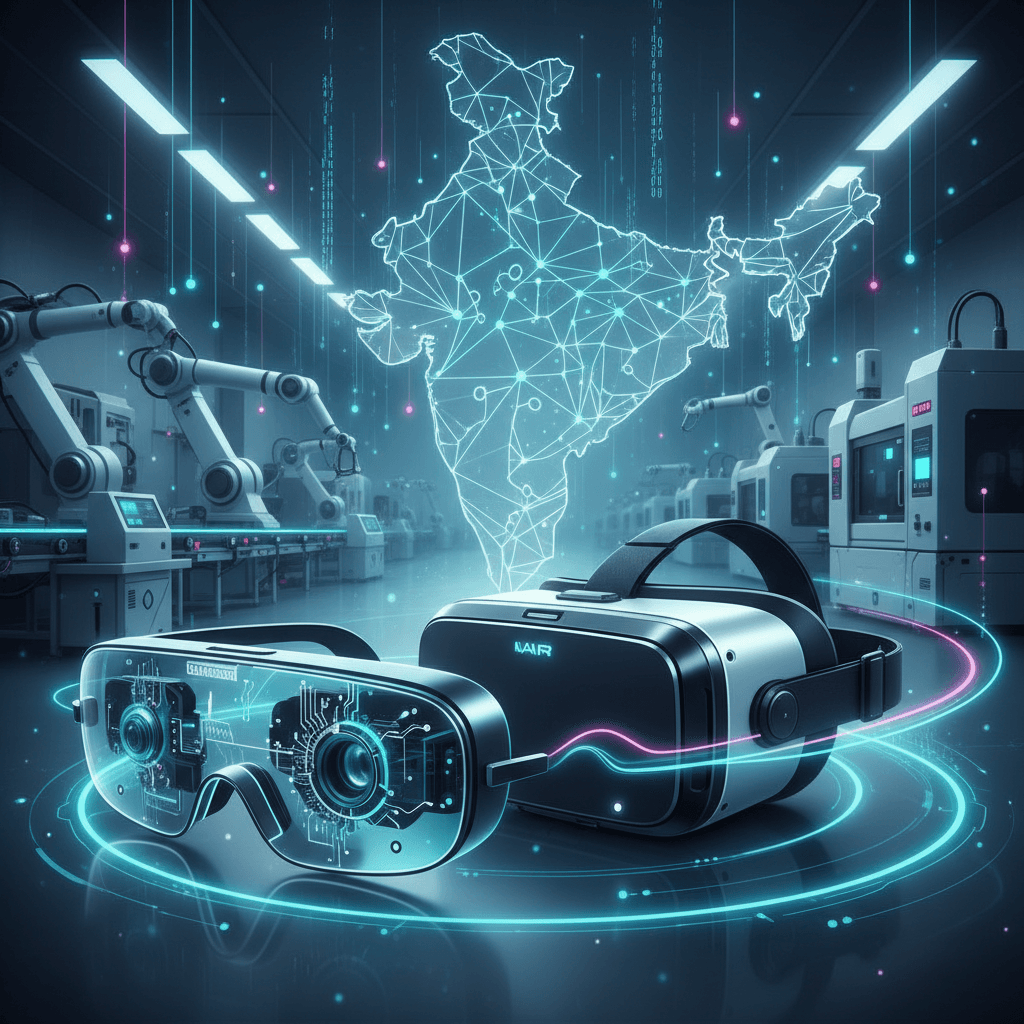QWR, Kaynes Forge India's First XR Hub, Igniting AI-Powered Device Manufacturing
This pioneering hub delivers India full-stack XR ownership, reducing import dependency and accelerating its AI-driven tech future.
October 7, 2025

In a landmark move set to redefine India's position in the global technology landscape, Pune-based deep-tech firm QWR Interactive Solutions has partnered with Kaynes Technology to establish the nation's first integrated manufacturing hub for Extended Reality (XR) devices. This strategic alliance is poised to create a comprehensive ecosystem for designing and producing advanced augmented reality (AR) headsets, virtual reality (VR) devices, and AI-powered smart glasses domestically. The collaboration aims to slash India's reliance on imported XR hardware by as much as 50% while generating over 1,000 skilled technology jobs by 2027, heralding a new chapter for the country's high-tech manufacturing ambitions and its burgeoning artificial intelligence sector.[1] The initiative represents a significant step towards achieving self-reliance in a critical, next-generation technology field, aligning directly with national policies to foster indigenous innovation and industrial capabilities.
The partnership is structured to leverage the distinct strengths of both companies, creating a powerful synergy between design innovation and manufacturing prowess. QWR, which stands for Question What's Real, will serve as the independent design house and original design manufacturer (ODM).[1] In this capacity, QWR will provide the crucial intellectual property, proprietary product designs, and sophisticated calibration protocols required for state-of-the-art XR hardware.[1] On the other side of the alliance, Kaynes Technology, a leading end-to-end electronics manufacturer with decades of experience, will provide the industrial might to scale production.[2] Kaynes is set to enhance its facilities with new surface mount technology and dedicated optical calibration lines to meet the precise demands of XR device manufacturing.[1] Suraj Aiar, the founder and CEO of QWR, articulated the venture's ambitious scope, stating, “With Kaynes, we're building deep-tech infrastructure that fuses design, waveguides, and device manufacturing – giving India full-stack ownership of the XR value chain.”[1] This vertical integration is fundamental to the partnership's goal of creating a self-sustaining ecosystem that controls the entire process from concept to consumer.
The manufacturing hub will be centered near Mysore, where a cutting-edge waveguide factory is already being established.[1] Waveguides are a critical and technically demanding optical component in AR glasses, and domestic production is a key dependency for the entire XR hardware industry. The facility's cleanroom standards are exceptionally high, meeting the stringent requirements for optical manufacturing.[1] A dedicated Assembly, Testing, Marking, and Packaging (ATMP) unit will also be established as part of the integrated process.[1] A core objective of the collaboration is to aggressively pursue localization. The partners have outlined a 16-month roadmap to transition from using 25% locally sourced materials to an impressive 80-85%, a move that will involve significant technology transfer and the development of local supply chains.[1] This rapid localization plan is crucial for reducing costs, securing the supply chain against global disruptions, and nurturing a network of domestic component suppliers, thereby amplifying the economic impact of the initial investment.
The implications of this manufacturing hub extend far beyond industrial policy, promising to be a significant catalyst for India's AI and software industries. The availability of locally produced, cost-effective XR hardware is expected to democratize access to these technologies, spurring widespread adoption and innovation. XR devices are increasingly intertwined with artificial intelligence; AI algorithms power essential features such as spatial tracking, gesture recognition, environment mapping, and personalized user experiences. As chipmakers like Qualcomm have emphasized, AI is critical for enabling next-generation immersive experiences by allowing devices to see what users see and hear what they hear to provide intuitive, context-aware assistance.[3] QWR is already at the forefront of this convergence with its development of AI-powered smart glasses, such as the HUMBL, designed for enterprise, defense, and educational applications.[1] By providing a domestic hardware platform, the QWR-Kaynes hub will empower Indian developers and AI companies to create solutions tailored for the Indian market, from AI-driven training simulations for the defense sector to immersive educational content for remote schools and advanced diagnostic tools for healthcare.
This venture arrives at a pivotal moment for India's technology market. The Indian XR market, valued at approximately USD 4.84 billion in 2023, is projected to experience explosive growth, with some forecasts predicting it will reach over USD 63 billion by 2033.[4][5] This growth is driven by increasing adoption across numerous sectors. In defense, XR is being used for advanced combat simulations and maintenance, enhancing soldier readiness and operational efficiency.[6][7] The education sector is leveraging immersive technology for interactive learning experiences, with some state governments partnering with tech firms to bring AR and VR skills to lakhs of students and teachers.[8][5] In healthcare, VR is being used for surgical training and therapy, offering realistic, risk-free environments for medical professionals to hone their skills. The establishment of a domestic manufacturing base will not only serve this burgeoning internal demand but also positions India to become a significant exporter in the global XR market, which is projected to exceed $150 billion by 2030.[1]
In conclusion, the partnership between QWR and Kaynes Technology is more than a business agreement; it is a strategic move to build a foundational pillar for India's future in the digital economy. By establishing an end-to-end manufacturing ecosystem for XR devices, the initiative will reduce import dependency, create high-value jobs, and foster a new wave of innovation in both hardware and software. It provides the critical missing piece in India's technology puzzle, creating a platform upon which the country's vibrant AI and developer communities can build the next generation of immersive applications. This hub will not only put "Made in India" XR devices into the hands of domestic consumers and enterprises but also signals the nation's readiness to compete and lead in the global technology value chain.